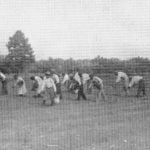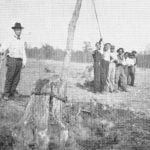In 1912 the prospectus of the Oak Hill Industrial Academy included the following announcements:
Free tuition and books are accorded neighborhood pupils under thirteen, that attend regularly after the time of their enrollment. Those over fourteen are expected to pay fifty cents a month. The hope is expressed that every one living near the Academy will see the propriety of making the same noble endeavor to enjoy its valuable privileges for improvement that is made by the many patrons who live at a distance.
An opportunity will be afforded a limited number of both boys and girls over fourteen years to work out their term expenditures, with the exception of $5.00 which must be paid at the time of enrollment. This opportunity to work one’s own way through school is given to two boys and two girls during the term at one time and to others during the vacation period.
After spending six and one-half or seven hours at study in the class room, three hours, in the latter part of the afternoon of each day, are devoted to industrial training and work on the farm, in the shop, kitchen, laundry or sewing room. All work during this period, is required to be done by the rule, which is first stated at the time of assignment, and afterwards illustrated during the hours of work; and the student is required to work as silently, thoughtfully and earnestly as during the hours previously devoted to study.
Parents are requested to note that girls are not allowed to wear white waists, skirts or dresses, except at the time of commencement and that each student must supply their own toilet soap, combs and shoe polish.
The Bible is a required text book and every student is expected to commit an average of one verse and read one chapter each day during the term. The passages committed to memory are recited in concert to the superintendent at the Bible Memory Service held every Sabbath afternoon.
The actual cost of carrying a boarding student through the term is about $50.00. Every student that pays $28.00 or does extra work to that amount enjoys a scholarship of equal amount contributed by the many friends who are supporting the institution. Under this arrangement the student that does most to help himself receives most from the friends who are ready to co-operate with him. The doors of the Academy are thus open to the penniless and homeless boy or girl, if they have a desire to be useful and are willing to work; but young people who lack funds and at the same time are unwilling to do extra work to cover the first half of their expenses, are not regarded as either promising or desirable.
Since one half the cost of carrying boarding students at the Academy has to be provided for by the generous offerings of friends, who are interested in their temporal, moral and spiritual welfare, every student is expected to show his appreciation of this fact, by being always thoughtful and earnest, during all the hours set apart each day for study and work. Only those who learn quickly how to be silent, thoughtful and earnest workers, make that improvement in study and work which forms the chief element in the reward of teachers and friends.
The student that makes the most encouraging progress is the one that enters at the beginning of the term and continues to attend and work faithfully until the end of it.
The annual report of the superintendent of Indian Territory for the year 1907 shows that at the Indian Orphan School at Wheelock, eight miles east of Oak Hill, the cost of carrying each pupil a term of nine months was $155.17, or an average of $17.05 a month. A comparison of these figures with the cost at that time at Oak Hill, $25.00 a term of seven months, or $3.60 a month, it is easy to see that the economy practiced in a mission school is much greater than in one under government control.
School And Work Periods
Provision is made for eight hours of school work on the part of the teachers, the first five days of every week of the term, and one hour on Saturday evening. These are daily enjoyed by all the smaller pupils. But all over fourteen years, after enjoying 6½ hours in the school room, are expected to work three hours each day in the latter part of the afternoon, and on Saturdays until 2:30 p. m.
The two leading objects that are attained by this arrangement are, the opportunity to give and receive practical instruction in the rules, or best methods of doing every part of the work in the home or on an improved farm; and enable those for whose benefit the institution has been established, to perform the work that is necessary to be done for the daily comfort of the students during term time, and the successful and economical management of the farm which now contains 270 acres, of which 140 acres are enclosed and 100 are under cultivation.
The Wood Supply
The sawing and splitting of the wood at the two woodpiles, to meet the daily demands of the many and large stoves, that have to be kept constantly running, is the regular morning and evening chore of those of the boys, that are not otherwise employed at that time about the buildings or stock. The preparation of the fuel in the timber and again at the woodpiles is, to say the least, a long and rather monotonous employment. Boys who do not manifest an interest in this part of their early training, by reason of its necessity and general healthfulness, are prone to regard it as a very wearisome employment, until they acquire skill in the matter of position and movement, and then their delight is manifested in efforts to outdo one another.
The Farm Work

In order that friends at a distance may know something of the regular methods of work during the three-hour work periods of each day and during the period of the term the following notes are added:
During the first four or more weeks of the term, all the available student help is busily employed gathering in the crops of cowpeas, potatoes, corn and cotton. In order that their undivided attention may be given to this important work at this time, all the wood needed for fuel during this period has to be brought from the timber, before the end of the previous term.
As soon as the crops have been gathered the long campaign for the year’s supply of wood in the timber,-about 25 cords, has to be undertaken and continued from week to week, especially on Saturdays until the end of the term.
If the necessary materials are on hand, this is the golden time to start the older and best trained boys on the permanent improvement work outlined for the year, such as fence building, sprouting, clearing of new lands, the construction of conveniences for the school, home or farm, the repair of old, the erection and painting of new buildings and finally, the preparation of the ground and planting of the crops for the next year.
The boys, however, are never taken to the timber or fields when the ground is damp or the weather is cold and unfavorable. When from these causes they cannot work to advantage, they continue their studies in the class room, all the day.
The two winter months of January and February have been ordinarily unfavorable for student work in the timber or fields. The work is then, to a considerable extent, limited to the carpenter shop, cellar, or indoor work on new buildings.
Improvement Work
In order that the work performed by the students during the industrial hours of each week, may serve to promote the welfare of the institution as well as for training the individual, it devolves upon the superintendent and matron to have ready suitable work, and all the tools and materials necessary to execute it, when the students are ready for assignment.
This work includes the chores morning and evening, the preparation of the fuel-about twenty-five cords annually, first in the timber and then at the woodpile-the cultivation of the farm and garden, the harvesting of the crops and the care of the stock, all of which may be termed necessary routine work.
In addition thereto there may be permanent improvement work, such as the clearing of new lands for cultivation and enclosing them with good fences, the repair of old and the erection of new buildings and the manufacture of articles of furniture or comfort, for the better equipment of the many rooms in the buildings.
A plain statement of these two kinds of work will indicate to nearly every one the prime importance of endeavoring to accomplish as much improvement work as possible each term. There is now more of this improvement work pressing for immediate attention than possibly may be done during the next three years, but it needs now to be contemplated, intelligently provided for, and then executed as speedily as possible.
Sawing Wood, A Picnic

Saturday forenoon has come to be recognized as the special fuel or timber day of each week. It is a busy and bustling day for all. For this day’s work two dozen boys are organized and equipped with axes, a splitting outfit, four crosscut saws and the mule team. The axe men are divided into two squads, the axe men or stumpers who cut down trees, and the trimmers who trim the trunks and large branches. Three boys are assigned to each crosscut, two of whom are expected to keep the saw running steadily, while the third one, who is supposed to be resting, carries a light lever and, with the weight of his body raises the log under the crosscut, so it will not bind the saw as it goes through it. By taking turns at the saw and lever, the hardness of this work is greatly relieved, and it sometimes is surprising to see the amount of work, done by the small boys, when they have “a mind to work.” If the logs are large or the saw runs hard, it is not unusual for them to couple together and merrily make the running of the saw a four-handed affair. The superintendent, or one of the older boys acting as a foreman, goes before the saws and with an axe marks out the work for them, so they can work speedily, and so that every piece that may serve for posts, long or short, or for fence props or rails, is cut the proper length.
The boys have worked faithfully and industriously in the timber on Saturday forenoons. A rest of fifteen minutes has always been given, about the middle of the forenoon. When the signal is given, they assemble at some convenient place, where there are several logs suited for seats; for all are required to be seated as the best way to rest their weary limbs, during this period.
A pail of fresh water and a paper sack filled with soda crackers is always provided for their enjoyment at this time. A smile of pleasure and delight is sure to light up the countenance of every boy, when, taking his turn, he thrusts his hand into the paper sack and draws there from his appointed number of crackers.
At these periods of rest and lunch all usually seem as happy as if they were enjoying a regular social picnic dinner. Amid the merriment and pleasantry of the occasion they seem to forget all consciousness of weariness, or thought that their work is hard, and resume it again with pleasure and delight.
